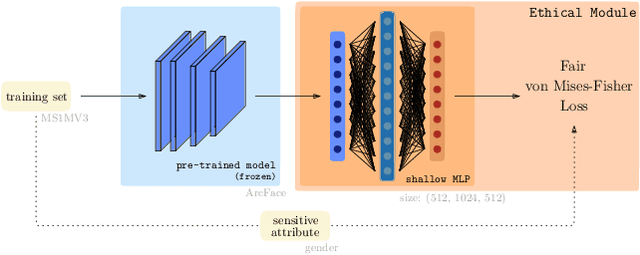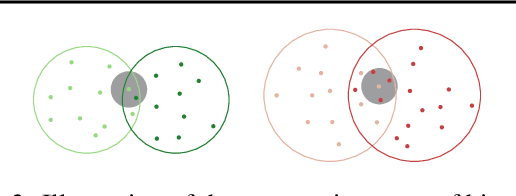Vincent Despiegel
Mitigating Gender Bias in Face Recognition Using the von Mises-Fisher Mixture Model
Oct 24, 2022



Abstract:In spite of the high performance and reliability of deep learning algorithms in a wide range of everyday applications, many investigations tend to show that a lot of models exhibit biases, discriminating against specific subgroups of the population (e.g. gender, ethnicity). This urges the practitioner to develop fair systems with a uniform/comparable performance across sensitive groups. In this work, we investigate the gender bias of deep Face Recognition networks. In order to measure this bias, we introduce two new metrics, $\mathrm{BFAR}$ and $\mathrm{BFRR}$, that better reflect the inherent deployment needs of Face Recognition systems. Motivated by geometric considerations, we mitigate gender bias through a new post-processing methodology which transforms the deep embeddings of a pre-trained model to give more representation power to discriminated subgroups. It consists in training a shallow neural network by minimizing a Fair von Mises-Fisher loss whose hyperparameters account for the intra-class variance of each gender. Interestingly, we empirically observe that these hyperparameters are correlated with our fairness metrics. In fact, extensive numerical experiments on a variety of datasets show that a careful selection significantly reduces gender bias.
One Picture is Worth a Thousand Words: A New Wallet Recovery Process
May 05, 2022



Abstract:We introduce a new wallet recovery process. Our solution associates 1) visual passwords: a photograph of a secretly picked object (Chabanne et al., 2013) with 2) ImageNet classifiers transforming images into binary vectors and, 3) obfuscated fuzzy matching (Galbraith and Zobernig, 2019) for the storage of visual passwords/retrieval of wallet seeds. Our experiments show that the replacement of long seed phrases by a photograph is possible.
 Add to Chrome
Add to Chrome Add to Firefox
Add to Firefox Add to Edge
Add to Edge